Compared: iPhone 13 Pro & iPhone 13 Pro Max vs iPhone 14 Pro & iPhone 14 Pro Max
Apple's iPhone 14 Pro and iPhone 14 Pro Max have arrived. Here's how they stack up versus the iPhone 13 Pro and Pro Max.
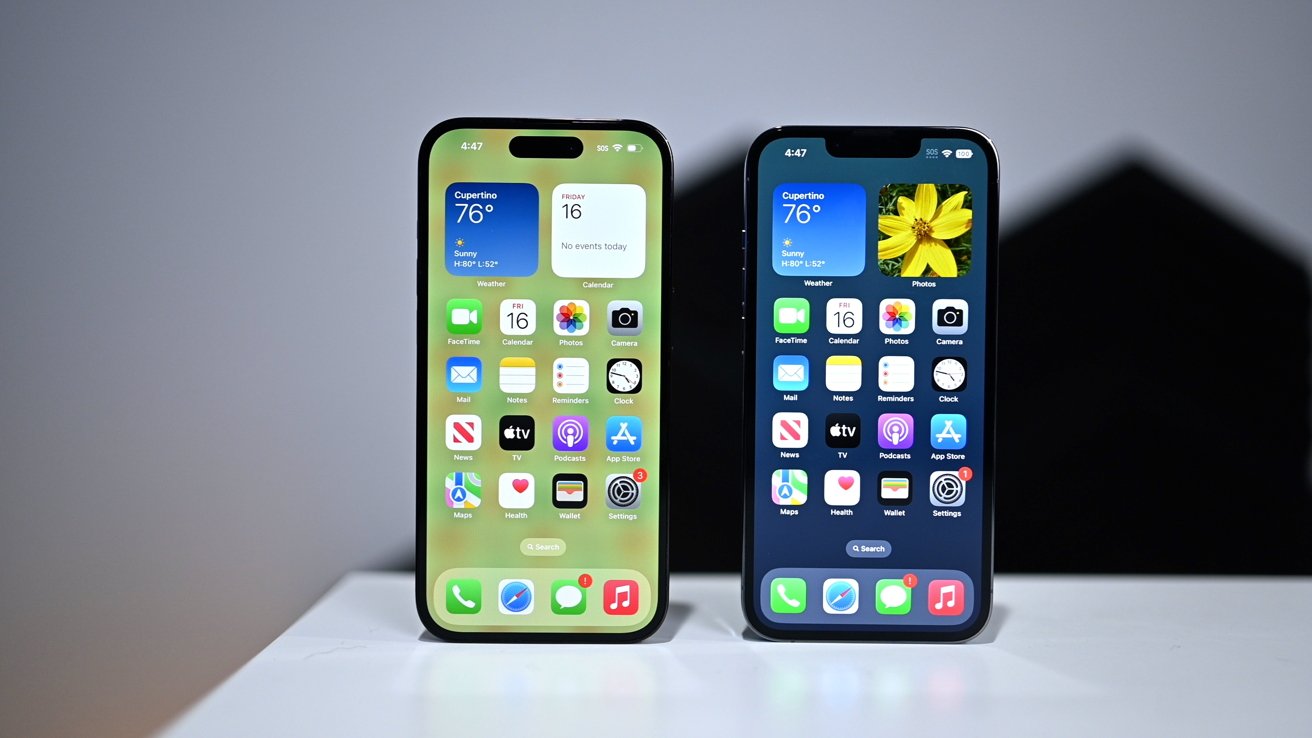
iPhone 14 Pro (left) and iPhone 13 Pro (right)
Apple unveiled the new models at its "Far Out" event on September 7, 2022. Both devices continue the recent trend of releasing four models, but they signal a new strategy because they pack some significant features that the lower tier doesn't have.
If you're wondering whether the new iPhone 14 Pro and iPhone 14 Pro Max are worth an upgrade, it's a good idea to compare them to the devices you already have. For owners of the iPhone 13 Pro and iPhone 14 Pro Max, it may be a tough decision -- and we're here to help.
Here's how the iPhone 13 Pro and iPhone 13 Pro Max fare against the newest iPhone 14 Pro and iPhone 14 Pro Max.
Apple's iPhone 13 Pro and iPhone 13 Pro Max are fairly large smartphones, though are in line with most modern flagship devices.
The iPhone 13 Pro measures 5.78 inches long by 2.82 inches wide, while the iPhone 13 Pro Max is 6.33 inches long and 3.07 inches wide. Both clock in at the same thickness of 0.30 inches. \
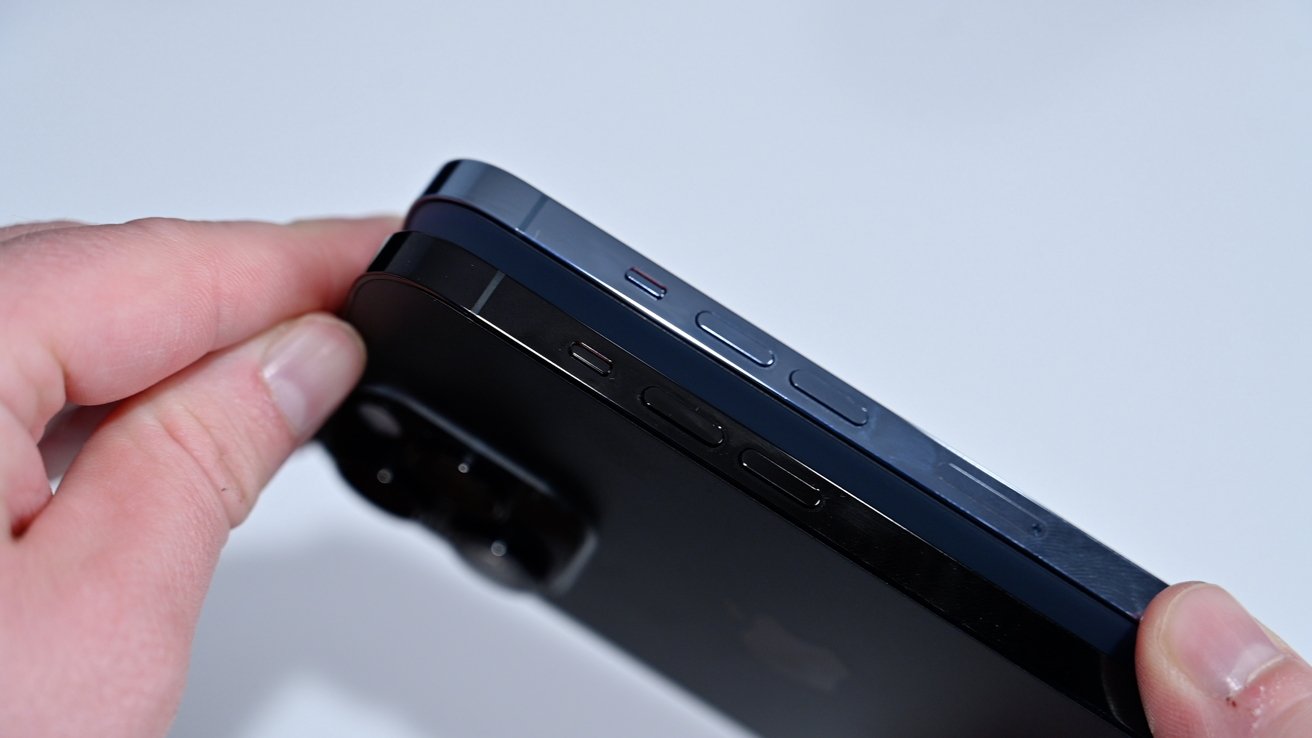
iPhone 13 Pro and iPhone 14 Pro are similar sizes
Regarding weight, the iPhone 13 Pro weighs 7.19 ounces, and the iPhone 13 Pro Max weighs 8.46 ounces.
Apple's iPhone 14 Pro and iPhone 14 Pro Max share the same general dimensions as their predecessors but with minor tweaks that most people won't notice.
The iPhone 14 Pro is longer but narrower at 5.81 inches by 2.81 inches and marginally thicker at 0.31 inches. The Pro Max is the same length at 6.33 inches but narrower at 3.05 inches and thicker at 0.31 inches.
As far as weight differences, the new devices are slightly heavier than the previous generation. The iPhone 14 Pro weighs 7.27 ounces, while the iPhone 14 Pro Max is heavier at 8.47 ounces.
The devices have a 6.1-inch OLED display and a 6.7-inch OLED display, respectively. The iPhone 13 Pro sports a 2,532 by 1,170 resolution at 460 pixels per inch (ppi), while the iPhone 13 Pro Max has a 2,778 by 1,284 resolution at 458 ppi.
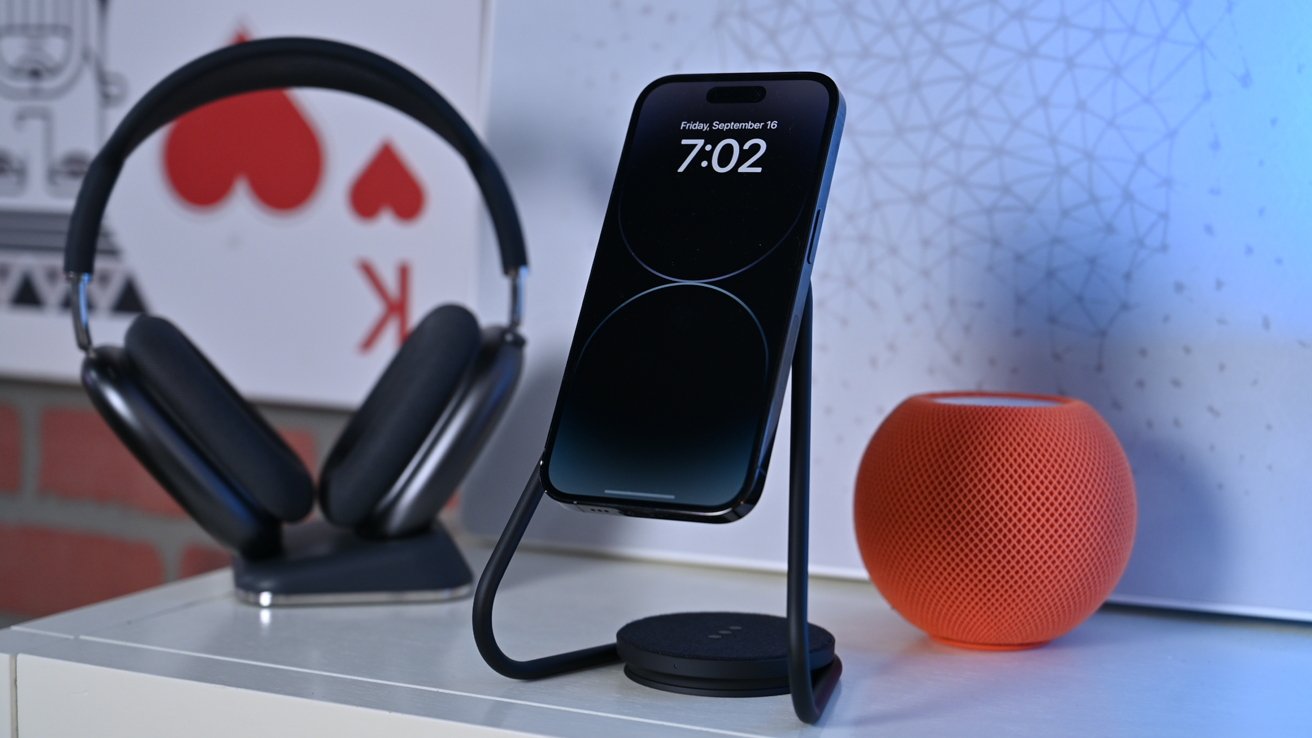
iPhone 14 Pro's always-on display
When it comes to the iPhone 14 Pro and iPhone 14 Pro Max, not a lot has changed on the display front. Both devices still sport a Super Retina XDR display that's OLED-based. They also retain the 6.1-inch and 6.7-inch display sizes, respectively.
The resolutions are higher, but only by a few pixels. The iPhone 14 Pro has a 2,556 by 1,179 resolution, whereas the iPhone 14 Pro Max has a 2,796 by 1,290 display.
Despite the resolution changes, the pixel densities are comparable, at 460ppi and 458ppi, respectively.
The most significant differences come down to the shape of the sensor and speakerphone cutout, as well as display capabilities.
The iPhone 14 Pro and iPhone 14 Pro Max have moved to a new cutout type that incorporates both a pill-shaped cutout and a hole-punch cutout, which theoretically offers more screen real estate. More cleverly, Apple's using a new Dynamic Island user interface that hides the cutouts with a notification-like feature.
Additionally, Apple has taken a cue from the Apple Watch with the new models and has added an always-on display capability on the new iPhone 14 Pros. Both models can drop their frame rates down to 1Hz, allowing users to see quick data at a glance without waking up their phones.
The devices are capable of taking professional-level images, as well as videos. Both devices have 4K video support at up to 60 fps, and features like ProRes video codec support and an updated Cinematic mode on the 14-generation that works at 4K at up to 30fps. There's a new filming mode available on the 2022 models, with Action Mode using enhanced processing to give gimbal-like image stabilization.
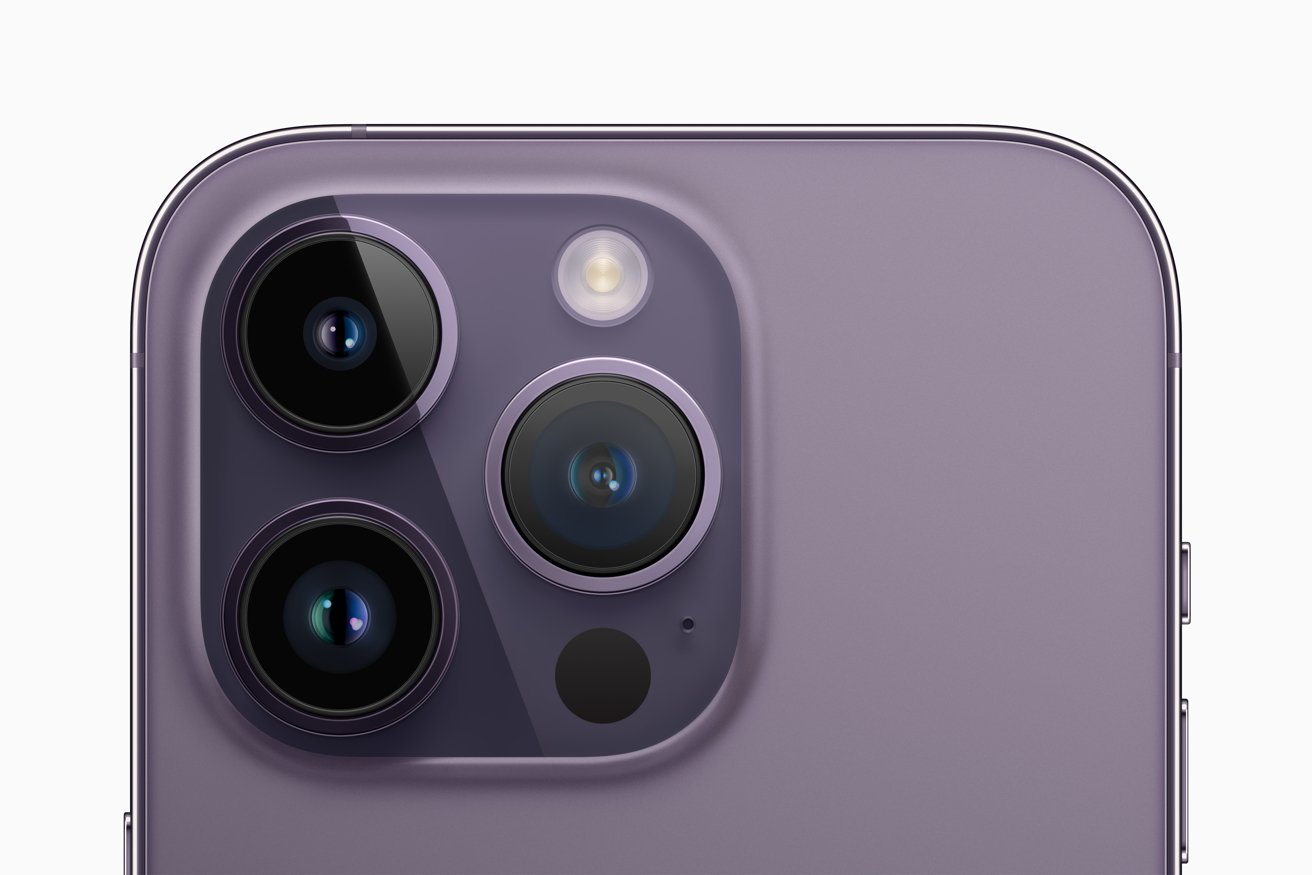
Apple's put a 48MP sensor in the Wide camera, up from the usual 12MP.
The biggest difference between the new iPhone 14 Pro and iPhone 14 Pro Max is the addition of a 48-megapixel "Quad-pixel" sensor for the Wide lens that's also 65% larger than the Wide on the iPhone 13 Pro. That's a stark departure from the 12MP sensors Apple has used on previous flagships.
Through the new 48MP sensor, Apple uses a technique called "pixel binning" that allows groups of four pixels to combine their image data into a single "pixel." This significantly boosts the low-light performance and color accuracy but also leaves open the possibility of capturing a 48-megapixel image.
Apple also uses that 48MP sensor to offer a new zoom level. While the regular lenses offer 0.5x, 1x, and 2x zoom, a new 2x uses the middle 12MP section of the 48MP sensor, producing a fourth zoom level that doesn't require a digital zoom.
A new Adaptive True Tone flash also adds adjustability to the flash. By using nine LEDs, the flash can adjust the pattern of light it produces so that the emitted light changes depending on the focal length of the photo itself.
On the front, the iPhone 14 Pro and iPhone 14 Pro Max have the same 12MP camera, though the company has made the aperture a bit wider and added better autofocus for FaceTime and video calls.
The two iPhone 13 Pro models sport an A15 Bionic, which uses a six-core CPU, a 5-core GPU, and a 16-core Neural Engine capable of 15.8 trillion operations per second. It also packs additional features like an Image Signal Processor for better imaging.
The iPhone 14 Pro and iPhone 14 Pro Max pack a next-generation A16 Bionic processor. The iPhone 14 and iPhone 14 Max do not.
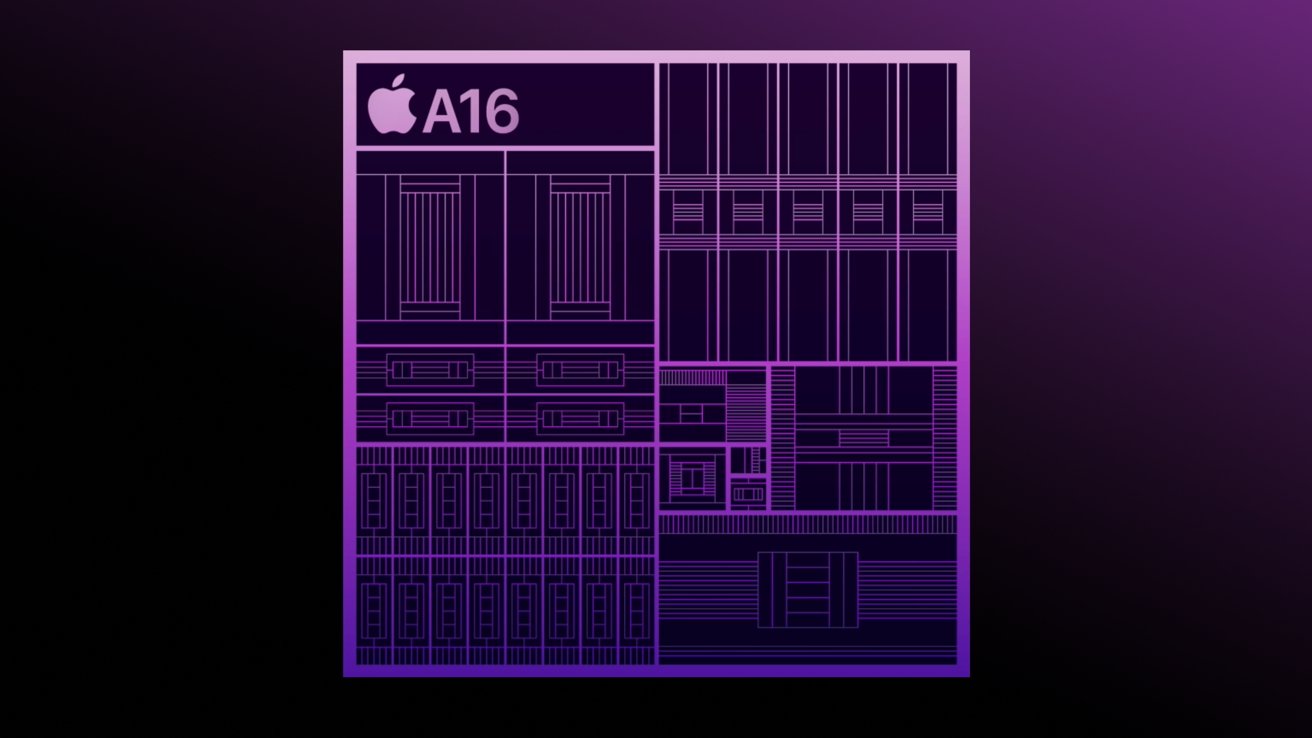
The A16 Bionic in the iPhone 14 Pro is naturally faster than the A15 Bionic.
While the A15 Bionic was the fastest smartphone chip on the market when it debuted, Apple says that the A16 Bionic is faster still. Apple says it's "up to 40 percent faster than the competition."
The 5-core GPU has been upgraded with 50% more memory bandwidth, while the 16-core Neural Engine has been updated to perform nearly 17 trillion operations per second.
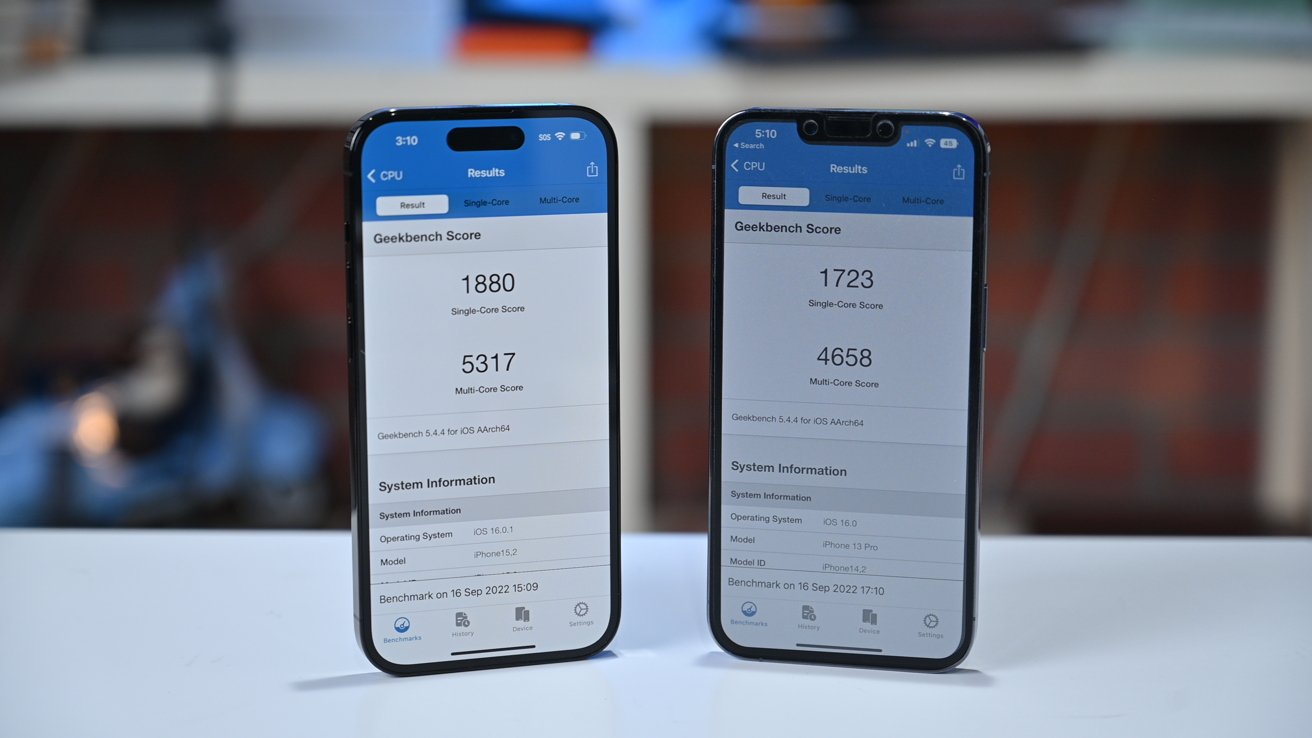
Geekbench 5 results
In Geekbench 5, we saw the iPhone 14 Pro with the A16 Bionic score 1880 and 5317 on the single and multi-core tests respectively. This is notably above the 1723 and 4658 the A15 Bionic in the iPhone 13 Pro scored -- and the iPhone 14 is not hugely above the iPhone 13.
However, the iPhone 14 Pro and iPhone 14 Pro Max usher in a new wave of satellite-based communications. Both models support Emergency SOS via Satellite, which means you'll be able to make emergency messages without nearby cellular service.
As far as other connectivity upgrades, the iPhone 14 Pro and iPhone 14 Pro Max both sport Wi-Fi 6 connectivity. Bluetooth 5.0 on the iPhone 13 Pro range has shifted to Bluetooth 5.3 for the iPhone 14 Pro.
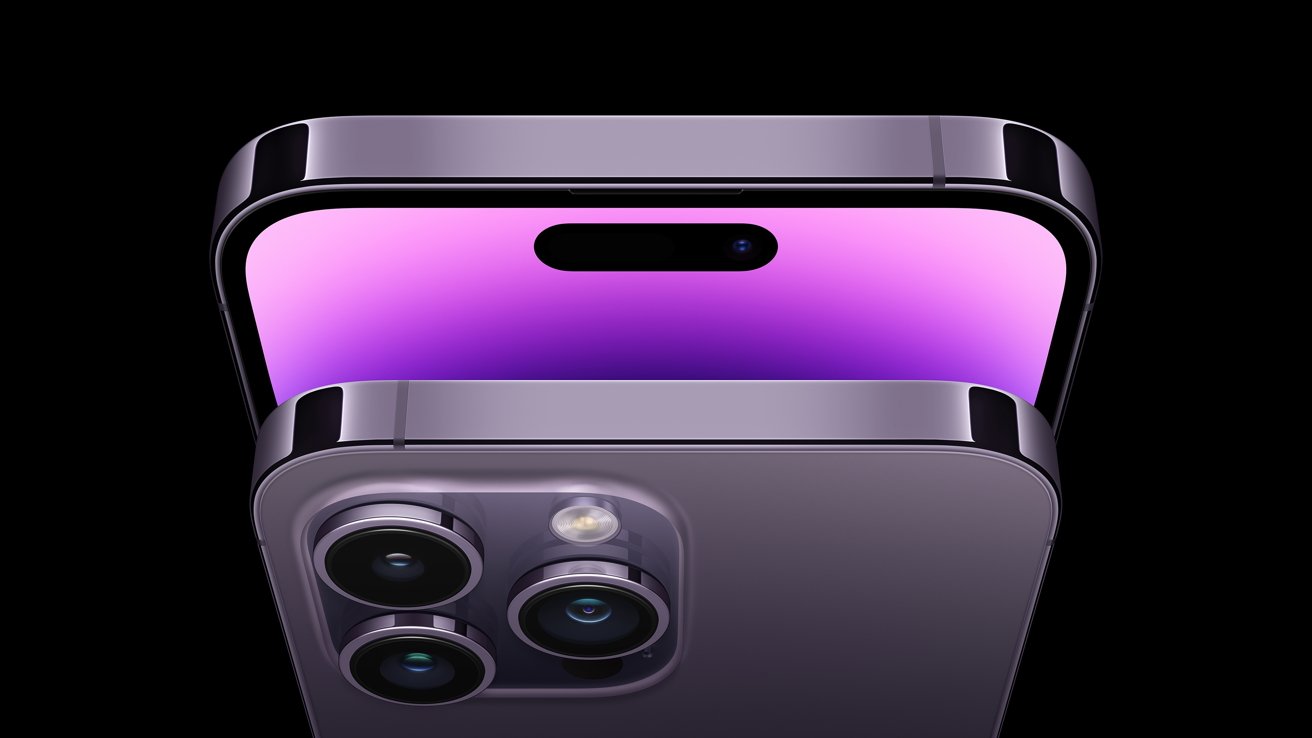
Apple uses a new Dynamic Island motif to hide the new display cutouts.
Using Lightning, there's fast charging as usual, with the Pro models achieving a 50% charge in 30 minutes on a 20W adapter, while the Pro Max versions need 35 minutes to do the same.
Apple also says that battery life is improved on the new models. The iPhone 14 Pro supports up to 23 hours of battery when used for local video playback, while the iPhone 14 Pro Max can last up to 29 hours.
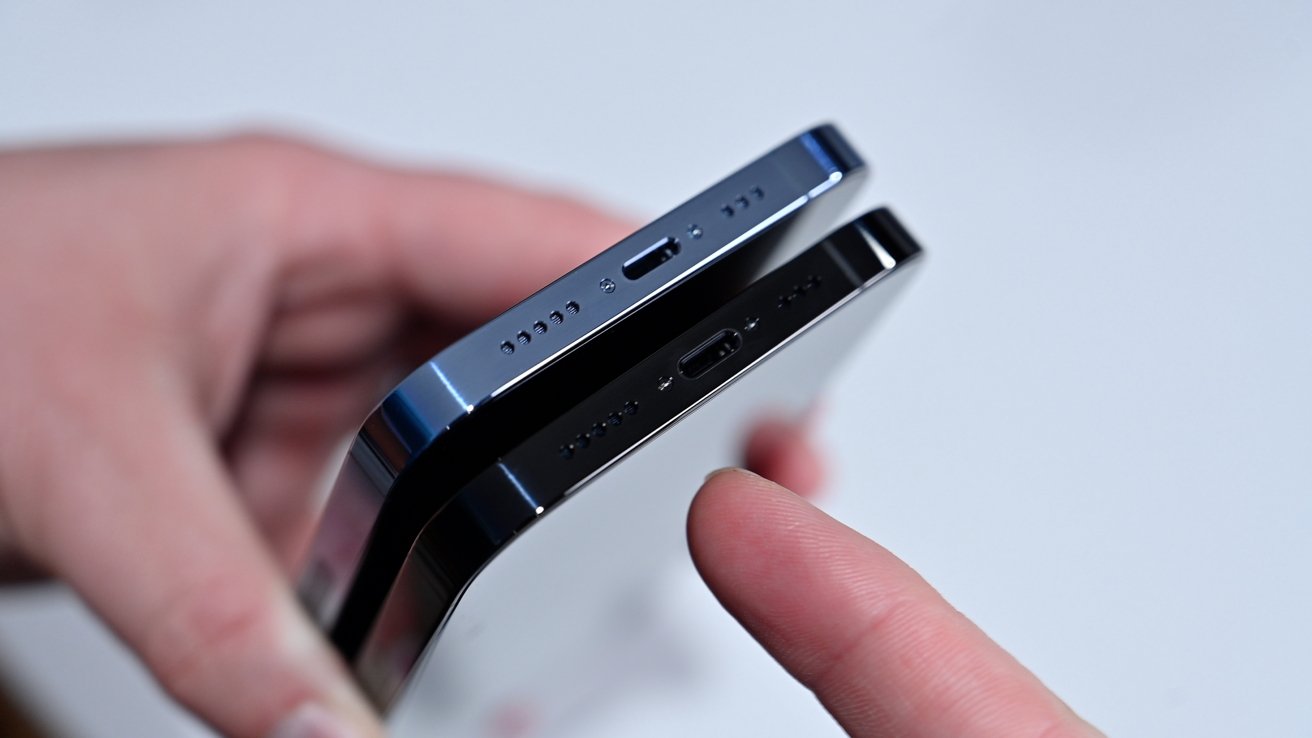
Both devices still rock the Lightning port
By contrast, the iPhone 13 Pro can handle up to 22 hours, and the Pro Max up to 28 hours.
In any case, all Pro models will be able to handle more than a day's use and potentially could last a weekend on battery with more prudent usage patterns.
To go with the new Emergency SOS via Satellite, the iPhone 14 Pro models both have Crash Detection. On detecting a potential car accident using its sensors, the iPhone will automatically put a call out to emergency services unless it receives a response from a passenger.
The iPhone 13 Pro started from $999 for the 128GB model, rising to $1,099 for the 256GB, $1,299 for the 512GB, and $1,499 for the 1TB configuration. The iPhone 13 Pro Max cost an extra $100, making the comparative capacities $1,099, $1,199, $1,399, and $1,599, respectively.
The company has stuck with the same pricing for relative capacities for the iPhone 14 Pro and iPhone 14 Pro Max. Entry-level 128GB models cost $999 and $1,099, while 1TB models cost $1,499 and $1,599, depending on the screen size.
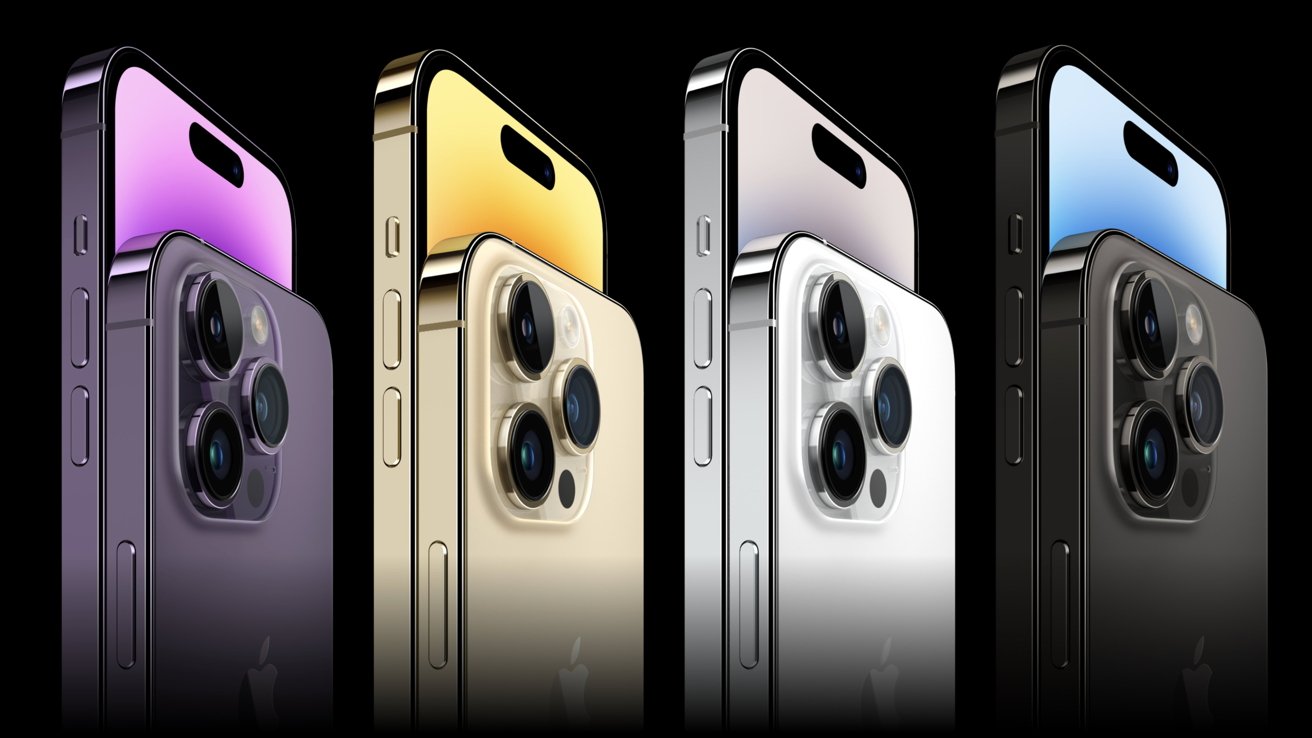
The colors of the iPhone 14 Pro range.
Apple offered the iPhone 13 Pro and Pro Max in a choice of five colors: Graphite, Silver, Gold, Sierra Blue, and later, Alpine Green.
The iPhone 14 Pro range is offered in slightly fewer colorways: Space Black, Gold, Silver, and Deep Purple.
However, when comparing the year-old version to the current generation, the decision is tougher. The iPhone 13 Pro and iPhone 13 Pro Max are still exceptional smartphones that stand on their own.
On the other hand, the iPhone 14 Pro and iPhone 14 Pro Max bring a lot of new capabilities to the table that might entice some early adopters or tech aficionados.
An always-on display will be welcomed by those who want core information they're tracking to be easily available without needing to worry about turning on the iPhone completely. The A16 chip will also be beneficial for anyone who demands high performance from their smartphone.
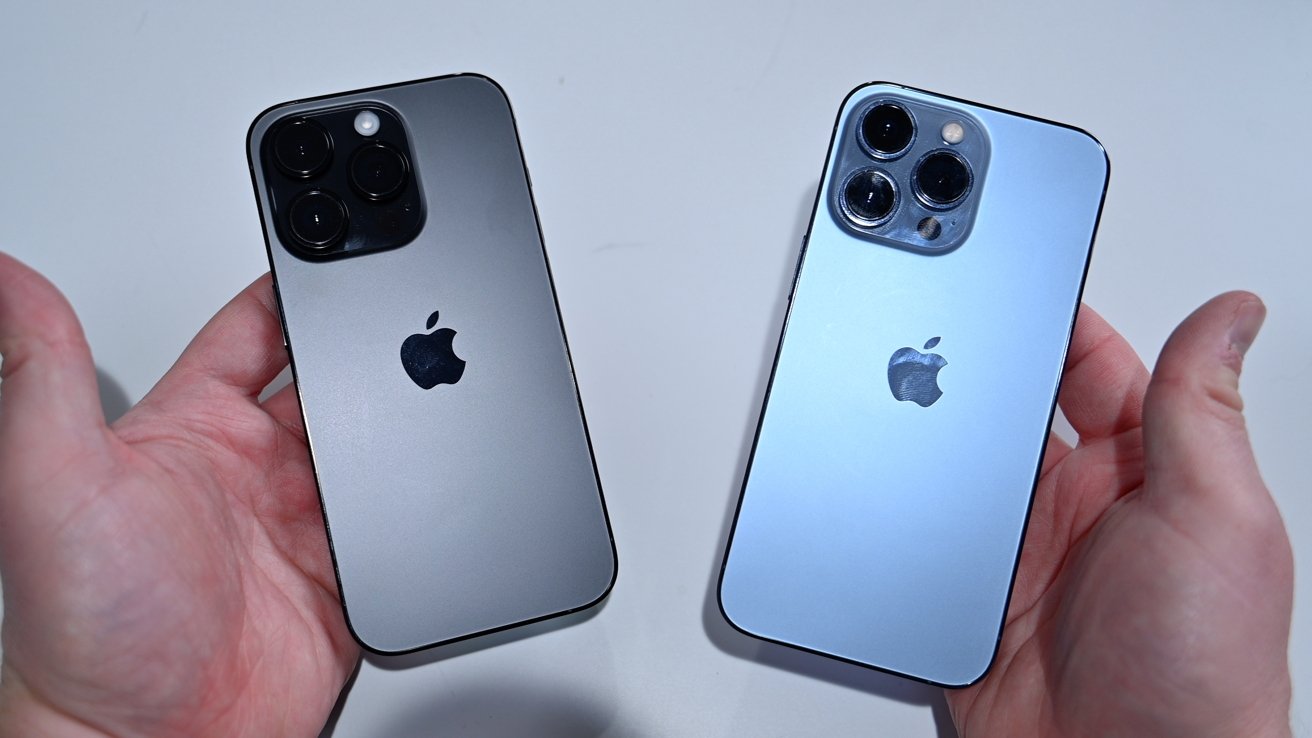
Comparing iPhone 14 Pro and iPhone 13 Pro
The camera change to 48MP for the Wide sensor has been a long time coming and will be a boon for videographers and photographers keen to take advantage of a readily-available camera in their pocket. Action Mode will also benefit video productions, which already embrace smartphones as impromptu video sources.
Those few people who like to go off-grid will probably want the additional safety of being able to summon help while in the wilderness that comes with the iPhone 14 Pro line.
An upgrade from the iPhone 13 Pro and Pro Max to the iPhone 14 Pro and Pro Max can be justifiable, but there's no shame in continuing with the iPhone 13 Pro and Pro Max. You're still getting most of the features in the iPhone 14 Pro by default, and not everyone will care that much about the camera or the always-on display.
For those who desperately need a 48MP imaging sensor in their iPhone, the update is certainly warranted, but it may not be for absolutely everyone.

iPhone 14 Pro (left) and iPhone 13 Pro (right)
Apple unveiled the new models at its "Far Out" event on September 7, 2022. Both devices continue the recent trend of releasing four models, but they signal a new strategy because they pack some significant features that the lower tier doesn't have.
If you're wondering whether the new iPhone 14 Pro and iPhone 14 Pro Max are worth an upgrade, it's a good idea to compare them to the devices you already have. For owners of the iPhone 13 Pro and iPhone 14 Pro Max, it may be a tough decision -- and we're here to help.
Here's how the iPhone 13 Pro and iPhone 13 Pro Max fare against the newest iPhone 14 Pro and iPhone 14 Pro Max.
Specifications
| Specifications | iPhone 13 Pro | iPhone 13 Pro Max | iPhone 14 Pro | iPhone 14 Pro Max |
|---|---|---|---|---|
| Price (starting) | $999 Check prices | $1,099 Check prices | $999 Check prices | $1,099 Check prices |
| Dimensions (inches) | 5.78 x 2.82 x 0.30 | 6.33 x 3.07 x 0.30 | 5.81 x 2.81 x 0.31 | 6.33 x 3.05 x 0.31 |
| Weight (ounces) | 7.19 | 8.46 | 7.27 | 8.47 |
| Processor | A15 Bionic | A15 Bionic | A16 Bionic | A16 Bionic |
| Storage | 128GB, 256GB, 512GB, 1TB | 128GB, 256GB, 512GB, 1TB | 128GB, 256GB, 512GB, 1TB | 128GB, 256GB, 512GB, 1TB |
| Display type | 6.1-inch Super Retina XDR, ProMotion | 6.7-inch Super Retina XDR, ProMotion | 6.1-inch Super Retina XDR, ProMotion, always-on display | 6.7-inch Super Retina XDR, ProMotion, always-on display |
| Resolution | 2,532 x 1,170 at 460ppi | 2,778 x 1,284 at 458ppi | 2,556 x 1,179 at 460ppi | 2,796 x 1,290 at 458ppi |
| True Tone | Yes | Yes | Yes | Yes |
| Biometrics | Face ID | Face ID | Face ID | Face ID |
| Connectivity | 5G (Sub-6GHz and mmWave) Gigabit-class LTE Wi-Fi 6 Bluetooth 5.0 | 5G (Sub-6GHz and mmWave) Gigabit-class LTE Wi-Fi 6 Bluetooth 5.0 | 5G (Sub-6GHz and mmWave) Gigabit-class LTE Wi-Fi 6 Bluetooth 5.3 Satellite Communications | 5G (Sub-6GHz and mmWave) Gigabit-class LTE Wi-Fi 6 Bluetooth 5.3 Satellite Communications |
| Rear Cameras | 12MP Wide 12MP Ultra Wide 12MP Telephoto | 12MP Wide12MP Ultra Wide 12MP Telephoto | 48MP Wide 12MP Ultra Wide 12MP Telephoto | 48MP Wide 12MP Ultra Wide 12MP Telephoto |
| Video | 4K 60fps, 4K 60fps HDR with Dolby Vision, 1080p 240fps Slo-Mo ProRes 4K 30fps, Cinematic Mode | 4K 60fps, 4K 60fps HDR with Dolby Vision, 1080p 240fps Slo-Mo ProRes 4K 30fps, Cinematic Mode | 4K 60fps, 4K 60fps HDR with Dolby Vision, 1080p 240fps Slo-Mo ProRes 4K 30fps, Cinematic Mode, Action Mode | 4K 60fps, 4K 60fps HDR with Dolby Vision, 1080p 240fps Slo-Mo ProRes 4K 30fps, Cinematic Mode, Action Mode |
| Front Camera | 12MP TrueDepth | 12MP TrueDepth | 12MP TrueDepth with Autofocus | 12MP TrueDepth with Autofocus |
| Battery Size (Video playback time) | Up to 22 hours | Up to 28 hours | Up to 23 hours | Up to 29 hours |
| Colors | Graphite, Gold, Silver, Sierra Blue, Alpine Green | Graphite, Gold, Silver, Sierra Blue, Alpine Green | Space Black, Gold, Silver, Deep Purple | Space Black, Gold, Silver, Deep Purple |
The iPhone 13 Pro measures 5.78 inches long by 2.82 inches wide, while the iPhone 13 Pro Max is 6.33 inches long and 3.07 inches wide. Both clock in at the same thickness of 0.30 inches. \

iPhone 13 Pro and iPhone 14 Pro are similar sizes
Regarding weight, the iPhone 13 Pro weighs 7.19 ounces, and the iPhone 13 Pro Max weighs 8.46 ounces.
Apple's iPhone 14 Pro and iPhone 14 Pro Max share the same general dimensions as their predecessors but with minor tweaks that most people won't notice.
The iPhone 14 Pro is longer but narrower at 5.81 inches by 2.81 inches and marginally thicker at 0.31 inches. The Pro Max is the same length at 6.33 inches but narrower at 3.05 inches and thicker at 0.31 inches.
As far as weight differences, the new devices are slightly heavier than the previous generation. The iPhone 14 Pro weighs 7.27 ounces, while the iPhone 14 Pro Max is heavier at 8.47 ounces.
iPhone 14 Pro and iPhone 14 Pro Max vs iPhone 13 Pro and iPhone 13 Pro Max - Displays
Apple's iPhone 13 Pro and iPhone 13 Pro Max are equipped with Super Retina XDR displays, which are OLED-based and offer support for the company's 120Hz variable refresh rate.The devices have a 6.1-inch OLED display and a 6.7-inch OLED display, respectively. The iPhone 13 Pro sports a 2,532 by 1,170 resolution at 460 pixels per inch (ppi), while the iPhone 13 Pro Max has a 2,778 by 1,284 resolution at 458 ppi.

iPhone 14 Pro's always-on display
When it comes to the iPhone 14 Pro and iPhone 14 Pro Max, not a lot has changed on the display front. Both devices still sport a Super Retina XDR display that's OLED-based. They also retain the 6.1-inch and 6.7-inch display sizes, respectively.
The resolutions are higher, but only by a few pixels. The iPhone 14 Pro has a 2,556 by 1,179 resolution, whereas the iPhone 14 Pro Max has a 2,796 by 1,290 display.
Despite the resolution changes, the pixel densities are comparable, at 460ppi and 458ppi, respectively.
The most significant differences come down to the shape of the sensor and speakerphone cutout, as well as display capabilities.
The iPhone 14 Pro and iPhone 14 Pro Max have moved to a new cutout type that incorporates both a pill-shaped cutout and a hole-punch cutout, which theoretically offers more screen real estate. More cleverly, Apple's using a new Dynamic Island user interface that hides the cutouts with a notification-like feature.
Additionally, Apple has taken a cue from the Apple Watch with the new models and has added an always-on display capability on the new iPhone 14 Pros. Both models can drop their frame rates down to 1Hz, allowing users to see quick data at a glance without waking up their phones.
iPhone 14 Pro and iPhone 14 Pro Max vs iPhone 13 Pro and iPhone 13 Pro Max - Cameras
Apple's iPhone 13 Pro and iPhone 13 Pro Max pack a flagship-level smartphone camera system that includes a 12-megapixel Ultra Wide lens, a 12-megapixel Wide lens, and a 12-megapixel Telephoto lens for optical zoom.The devices are capable of taking professional-level images, as well as videos. Both devices have 4K video support at up to 60 fps, and features like ProRes video codec support and an updated Cinematic mode on the 14-generation that works at 4K at up to 30fps. There's a new filming mode available on the 2022 models, with Action Mode using enhanced processing to give gimbal-like image stabilization.

Apple's put a 48MP sensor in the Wide camera, up from the usual 12MP.
The biggest difference between the new iPhone 14 Pro and iPhone 14 Pro Max is the addition of a 48-megapixel "Quad-pixel" sensor for the Wide lens that's also 65% larger than the Wide on the iPhone 13 Pro. That's a stark departure from the 12MP sensors Apple has used on previous flagships.
Through the new 48MP sensor, Apple uses a technique called "pixel binning" that allows groups of four pixels to combine their image data into a single "pixel." This significantly boosts the low-light performance and color accuracy but also leaves open the possibility of capturing a 48-megapixel image.
Apple also uses that 48MP sensor to offer a new zoom level. While the regular lenses offer 0.5x, 1x, and 2x zoom, a new 2x uses the middle 12MP section of the 48MP sensor, producing a fourth zoom level that doesn't require a digital zoom.
A new Adaptive True Tone flash also adds adjustability to the flash. By using nine LEDs, the flash can adjust the pattern of light it produces so that the emitted light changes depending on the focal length of the photo itself.
On the front, the iPhone 14 Pro and iPhone 14 Pro Max have the same 12MP camera, though the company has made the aperture a bit wider and added better autofocus for FaceTime and video calls.
iPhone 14 Pro and iPhone 14 Pro Max vs iPhone 13 Pro and iPhone 13 Pro Max - Processing Performance
Each year, Apple improves the processing capabilities of its flagship iPhones with a new chip, and 2021 is no exception.The two iPhone 13 Pro models sport an A15 Bionic, which uses a six-core CPU, a 5-core GPU, and a 16-core Neural Engine capable of 15.8 trillion operations per second. It also packs additional features like an Image Signal Processor for better imaging.
The iPhone 14 Pro and iPhone 14 Pro Max pack a next-generation A16 Bionic processor. The iPhone 14 and iPhone 14 Max do not.

The A16 Bionic in the iPhone 14 Pro is naturally faster than the A15 Bionic.
While the A15 Bionic was the fastest smartphone chip on the market when it debuted, Apple says that the A16 Bionic is faster still. Apple says it's "up to 40 percent faster than the competition."
The 5-core GPU has been upgraded with 50% more memory bandwidth, while the 16-core Neural Engine has been updated to perform nearly 17 trillion operations per second.

Geekbench 5 results
In Geekbench 5, we saw the iPhone 14 Pro with the A16 Bionic score 1880 and 5317 on the single and multi-core tests respectively. This is notably above the 1723 and 4658 the A15 Bionic in the iPhone 13 Pro scored -- and the iPhone 14 is not hugely above the iPhone 13.
iPhone 14 Pro and iPhone 14 Pro Max vs iPhone 13 Pro and iPhone 13 Pro Max - 5G and connectivity
The iPhone 13 Pro and iPhone 13 Pro Max both have 5G connectivity, a trend Apple continues with the iPhone 14 Pro and iPhone 14 Pro Max.However, the iPhone 14 Pro and iPhone 14 Pro Max usher in a new wave of satellite-based communications. Both models support Emergency SOS via Satellite, which means you'll be able to make emergency messages without nearby cellular service.
As far as other connectivity upgrades, the iPhone 14 Pro and iPhone 14 Pro Max both sport Wi-Fi 6 connectivity. Bluetooth 5.0 on the iPhone 13 Pro range has shifted to Bluetooth 5.3 for the iPhone 14 Pro.
iPhone 14 Pro and iPhone 14 Pro Max vs iPhone 13 Pro and iPhone 13 Pro Max - Power and battery
Like many iPhones before them, the iPhone 14 Pro and iPhone 14 Pro Max continue to use the Lightning connector and also sport Apple's upgraded MagSafe wireless charging standard. It's the same setup Apple used on the iPhone 13 Pro and iPhone 13 Pro Max.
Apple uses a new Dynamic Island motif to hide the new display cutouts.
Using Lightning, there's fast charging as usual, with the Pro models achieving a 50% charge in 30 minutes on a 20W adapter, while the Pro Max versions need 35 minutes to do the same.
Apple also says that battery life is improved on the new models. The iPhone 14 Pro supports up to 23 hours of battery when used for local video playback, while the iPhone 14 Pro Max can last up to 29 hours.

Both devices still rock the Lightning port
By contrast, the iPhone 13 Pro can handle up to 22 hours, and the Pro Max up to 28 hours.
In any case, all Pro models will be able to handle more than a day's use and potentially could last a weekend on battery with more prudent usage patterns.
iPhone 14 Pro and iPhone 14 Pro Max vs iPhone 13 Pro and iPhone 13 Pro Max - Other Features
Apple rates all models at IP68, which it claims gives dust and water resistance to a maximum depth of 6 meters for up to 30 minutes.To go with the new Emergency SOS via Satellite, the iPhone 14 Pro models both have Crash Detection. On detecting a potential car accident using its sensors, the iPhone will automatically put a call out to emergency services unless it receives a response from a passenger.
iPhone 14 Pro and iPhone 14 Pro Max vs iPhone 13 Pro and iPhone 13 Pro Max - Capacity, color, and pricing
Apple's iPhone 13 Pro and iPhone 13 Pro Max shipped with 128GB, 256GB, 512GB, and 1TB storage options. The iPhone 14 Pro and iPhone 14 Pro Max share the same configurations.The iPhone 13 Pro started from $999 for the 128GB model, rising to $1,099 for the 256GB, $1,299 for the 512GB, and $1,499 for the 1TB configuration. The iPhone 13 Pro Max cost an extra $100, making the comparative capacities $1,099, $1,199, $1,399, and $1,599, respectively.
The company has stuck with the same pricing for relative capacities for the iPhone 14 Pro and iPhone 14 Pro Max. Entry-level 128GB models cost $999 and $1,099, while 1TB models cost $1,499 and $1,599, depending on the screen size.

The colors of the iPhone 14 Pro range.
Apple offered the iPhone 13 Pro and Pro Max in a choice of five colors: Graphite, Silver, Gold, Sierra Blue, and later, Alpine Green.
The iPhone 14 Pro range is offered in slightly fewer colorways: Space Black, Gold, Silver, and Deep Purple.
iPhone 14 Pro and iPhone 14 Pro Max vs iPhone 13 Pro and iPhone 13 Pro Max - Should you upgrade?
If you're on an upgrade cycle or you've been waiting for the latest generation to upgrade, then buying an iPhone 14 Pro or iPhone 14 Pro Max is a no-brainer.However, when comparing the year-old version to the current generation, the decision is tougher. The iPhone 13 Pro and iPhone 13 Pro Max are still exceptional smartphones that stand on their own.
On the other hand, the iPhone 14 Pro and iPhone 14 Pro Max bring a lot of new capabilities to the table that might entice some early adopters or tech aficionados.
An always-on display will be welcomed by those who want core information they're tracking to be easily available without needing to worry about turning on the iPhone completely. The A16 chip will also be beneficial for anyone who demands high performance from their smartphone.

Comparing iPhone 14 Pro and iPhone 13 Pro
The camera change to 48MP for the Wide sensor has been a long time coming and will be a boon for videographers and photographers keen to take advantage of a readily-available camera in their pocket. Action Mode will also benefit video productions, which already embrace smartphones as impromptu video sources.
Those few people who like to go off-grid will probably want the additional safety of being able to summon help while in the wilderness that comes with the iPhone 14 Pro line.
An upgrade from the iPhone 13 Pro and Pro Max to the iPhone 14 Pro and Pro Max can be justifiable, but there's no shame in continuing with the iPhone 13 Pro and Pro Max. You're still getting most of the features in the iPhone 14 Pro by default, and not everyone will care that much about the camera or the always-on display.
For those who desperately need a 48MP imaging sensor in their iPhone, the update is certainly warranted, but it may not be for absolutely everyone.


Comments
For me, the question is would that make any significant difference over a 13 Pro on T-Mobile?